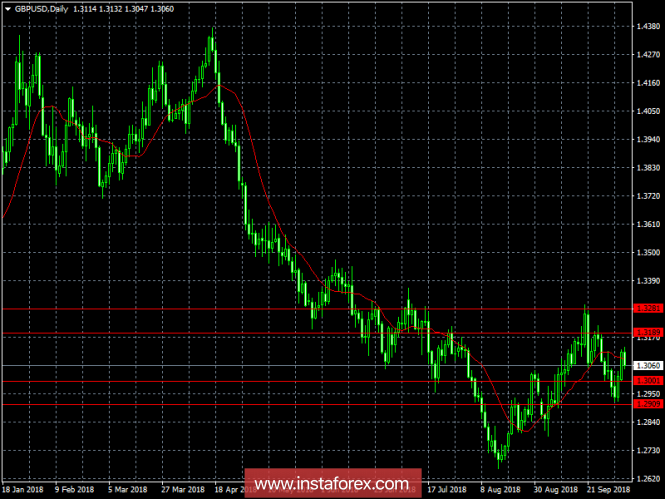Over the past week, the pound was able to improve its position quite well, although for almost the entire week it was accompanied by regular statements about Brexit. And the nature of these statements was rather negative. Not only that, they still remember the virtual failure of the negotiations between the UK and the European Union, which ended in almost a scandal. So, Theresa May, who spoke at the conference of the Conservative party, rather aggravated the situation, since the thesis she had spoken about was what will be the interaction of the United Kingdom and continental Europe after the divorce, which rather gave rise to new questions than answers. From her words, it was extremely difficult to understand how the trade would be built, which is the most important issue. And all this is accompanied by constant criticism from the political opponents of the current prime minister of Great Britain. And the accusations are quite sharp, as it is stated that the plan that Theresa May intends to sign will eventually lead to an economic collapse of the United Kingdom. However, the pound quickly received support from the Europeans, as Mr. Barnier, who is responsible for negotiations with the UK from the European Union, said that the parties have reached the final stage of negotiations and will soon sign the final version of the agreement. Although the details of the agreement itself are not yet clear, it is still encouraging. In any case, the parties must somehow regulate their relations after the UK leaves the European Union. If there is no agreement, it is unclear how to build an investment strategy for the largest players. So a bad agreement is better than no agreement at all.
If you look at the data, only one event really had a negative impact on the dollar. To do this, we need to recall the content of the report of the US Department of Labor. In fairness, it should be noted that by the time of its publication, the panic about Italy had somewhat subsided, and market participants could read with peace of mind the content of the report, which caused only tears. The unemployment rate, of course, fell from 3.9% to 3.7%, but this was the only thing to be happy about. The share of the labor force in the total population remained unchanged, and only 134,000 new jobs were created outside agriculture, which is significantly less than the projected 185,000. And last month 270,000 new jobs were created, so the results are extremely deplorable. Average hourly wage growth slowed from 2.9 percent to 2.8 percent. Although other data on the labor market, which were released on the eve of the publication of the report of the Ministry of Labor, were encouraging. In particular, according to ADP, employment grew by 230,000 against 163,000 in the previous month. The total number of applications for unemployment benefits fell by 21,000 due to the fact that the number of initial claims decreased by 8,000, and repeated another 13,000. Also, construction costs increased by 0.1% and factory orders 2.3%. Moreover, sales of vehicles increased from 16.7 million to 17.4 million the index of business activity in the manufacturing sector grew by 54.7 to 55.6, while in services it dropped from 54.8 to 53.5. As a result, the composite index of business activity decreased from 54.7 to 53.9, since the service sector has a much greater impact. But all these data came out when the market was excited by the events in the Italian Parliament. And the significance of the report of the Ministry of Labor is much higher than all these data combined.
If we talk about British data, it clearly did not shine. Of course, the volume of consumer lending increased by 1.1 billion pounds against 0.8 billion in the previous period, and the number of approved mortgage applications increased from 65,156 to 66,440. Also, the index of business activity in the manufacturing sector rose from 53.0 to 53.8. However, the index of business activity in the service sector decreased from 54.3 to 53.9, and in the construction sector from 52.9 to 52.1. Moreover, according to Nationwide, the growth rate of housing prices remained unchanged, and according to Halifax, they slowed from 3.7% to 2.5%. But the state of the real estate market is one of the main criteria for determining the investment attractiveness of the UK and the pound.
Although last week very important data were already released, this will not let us relax, since data on inflation in the US will be released. They will be preceded by data on producer prices, the growth rate of which should remain unchanged. But inflation itself can accelerate from 2.7% to 2.8%, and such a development of events should finally remove all doubts about the Federal Reserve's further actions. If inflation does not slow down, and steadily, the Federal Open Market Commission will continue to tighten monetary policy, in accordance with the previously outlined plans. But commodity stocks in wholesale warehouses may increase by 0.7%, and if the forecast is confirmed, it will mean that they have been growing for eleven consecutive months. So it is safe to worry about the further growth of industrial production and retail sales. The number of applications for unemployment benefits should be reduced by another 2,000 due to a decrease in the number of initial applications for benefits. The number of re-applications may remain unchanged.
Unlike the United States, in the UK almost no significant data is released. Attention should be focused only to industrial production, the growth rate of which can accelerate from 0.9% to 1.1%. Of course, the main driving force is the negotiations on Brexit, and it will have a serious impact. However, after such a busy few weeks, the parties can take a short break, and the market will pay more attention to data. And, as you can see, macroeconomic forecasts favor the dollar more, so the pound may fall to 1.2925.

